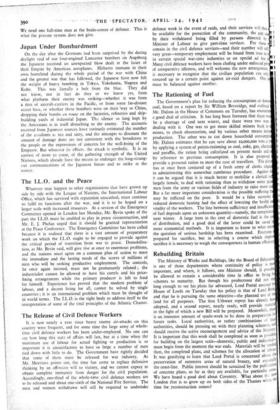The Rationing of Fuel
The Government's plan for reducing the consumption of dom coal, based on a report by Sir William Beveridge, and outlined Mr. Dalton in the House of Commons on Tuesday, has encount a good deal of criticism. It has long been foreseen that there w be a shortage of coal next winter, and there were two ways dealing with it. One was to get more skilled miners back to mines, to check absenteeism, and by various other means in production. The other was to cut down household consump Mr. Dalton estimates that he can save about to,000,000 tons a y by applying a system of points-rationing to coal, coke, gas, electri and paraffin, the ration being calculated on present needs and by reference to previous consumption. It is also proposed provide a personal ration to meet the case of travellers. The pi has at once been conjured up of a fresh army of clerks engag in administering this somewhat cumbrous procedure. Against it can be argued that it is much better to mobilise a clerical s largely female, to deal with rationing than to withdraw some 3o, men from the army or various fields of industry to raise more c But a far more important consideration is the possible suffering may be inflicted on the poor. It would be a false economy reduced domestic heating had the effect of lowering the health vitality of the workers. The line between sufficiency and insufficien of fuel depends upon an unknown quantity—namely, the tempera next winter. A large item in the cost of domestic fuel is the c of distribution, and a good deal of the latter could be saved more economical methods. It is important to know to what ma the question of serious hardship has been examined. Everyone prepared for sacrifice, but in selecting a course which imPos sacrifice it is necessary to weigh the consequences in human efficien






















 Previous page
Previous page